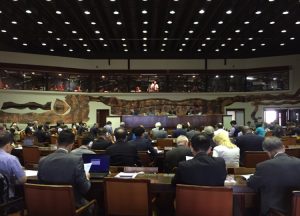Deep-sea mining involves a collection of government, inter-government, industry, scientific, academic, civil society and other interests.
Exploration
As of January 2020, the International Seabed Authority (ISA) has issued permits and entered into 30 contracts for exploration for polymetallic nodules, polymetallic sulphides and cobalt-rich ferromanganese crusts in the deep-seabed with 21 contractors.

Photo Credit: NOAA
Eighteen of these contracts are for exploration for polymetallic nodules in the Clarion-Clipperton Fracture Zone, Indian Ocean and Western Pacific Ocean. There are seven contracts for exploration for polymetallic sulphides in the South West Indian Ridge, Central Indian Ridge and the Mid-Atlantic Ridge and five contracts for exploration for cobalt-rich crusts in the Western Pacific Ocean and the South West Atlantic.
The contractors are a mix of corporate enterprises and state-owned companies, with several governments keen to establish the rights to mine and to gain a foothold on the international seabed. Of the thirty exploration contracts the ISA has issued to date, at least eighteen are held by only seven countries – China, France, Germany, India, Japan, Russia and South Korea – through their state owned companies or government agencies and ministries. Another seven contracts are effectively in the hands of three private companies: DeepGreen, a privately held Canadian company; UK Seabed Resources, a subsidiary of US based Lockheed Martin; and Global Sea Mineral Resources, a subsidiary of the Belgium company DEME Group.
A growing group of scientists is also actively studying the deep sea (about which we still have so little information) and the potential impacts that mining would have at depth. Some of the scientists are affiliated with national agencies and/or corporations with a commercial interest in deep-sea mining that are prospecting and exploring for deep-sea minerals, in which case their findings are often kept confidential though several such companies have allowed scientists working for them to publish their findings. Others conduct their work in the context of regional or global initiatives or groupings which make their findings publicly available. These include the MIDAS Project, the JPI Oceans MiningImpact I & II projects, the Abyssal Biological Baseline Project; the Deep Ocean Stewardship Initiative, and INDEEP – a global network of deep-sea scientists, among others.
Click here for a full list of licenses granted to companies.
DSCC Member Organizations
DSCC member organizations focused on deep-sea mining include Blue Marine Foundation, Conservation International, Deep Sea Mining Campaign, EarthWorks, Ecologistas En Acción, Fauna & Flora International, German NGO Forum on Environment and Development, Goa Foundation, Global Ocean Trust, Greenpeace International, The Oxygen Project, Pew Charitable Trusts, Sciaena, Seas At Risk, WWF.
